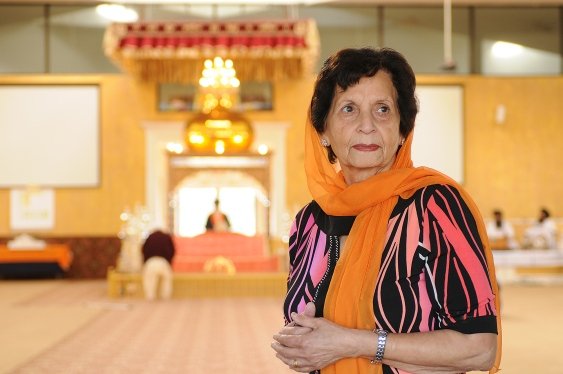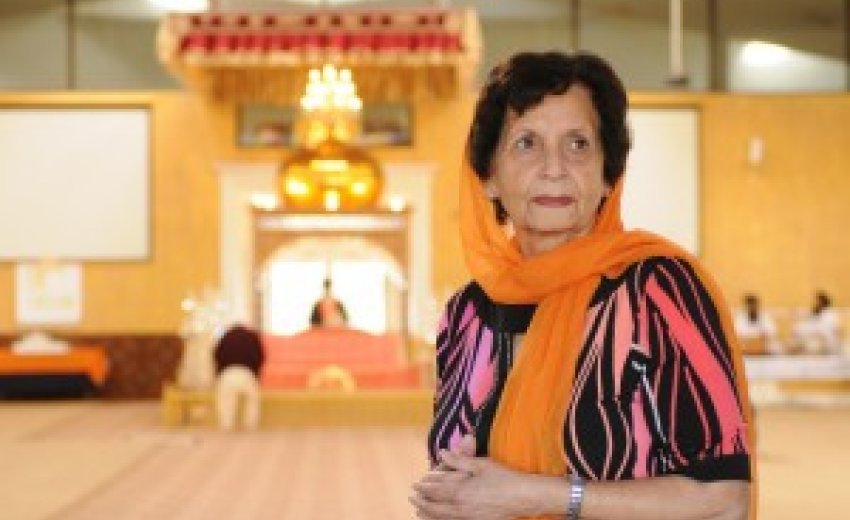 |
| Narinjan Kaur at the Ross St. Temple. photo: Dan Toulgoet |
October 28, 2013: Two years into her term as the first woman on the Khalsa Diwan Society’s executive, Narinjan Kaur Mand says the Sikh society has come a long way. But she says the South Asian community is still behind mainstream Vancouver when it comes to seeing women in positions of power.
Three women were endorsed by the membership of the Ross Street Gurdwara, or Sikh temple, in 2011. Mand serves as recording secretary for the society that runs on Southeast Marine Drive and Nasib Kaur Badyal and Shindo Kaur Mangat were chosen to be members at large.
Sikhs founded the Khalsa Diwan Society in Vancouver in 1906.
It took 105 years from the society’s inception to see a woman on the executive for a couple of reasons, Mand said.
“First of all, the old women are not educated,” she said, adding that’s the case for some women in India even still. “As usual, it’s a man’s world.”
Mand wants changes in the gurdwara and Sikh society.
“But we can’t do that,” said the petite 78-year-old who wore an orange headscarf during an interview last week.
Mand believes traditions that aren’t true to the Guru Granth Sahib, or Sikh scriptures, should be more closely aligned with the holy text, but she suspects saying so would make other women think she’s uppity.
“It’s very hard to change people,” she said.
Mand wouldn’t be more specific about the traditions she’d change, saying: “I don’t want to be in trouble.”
She says when Sikhs came to Vancouver in the early 1900s, they tried to mix with other general society. But now that their population has grown, too many Sikhs, even some who have been here 40 years, don’t mingle with the broader community and remain “stuck to old things,” she said.
Most of the people who frequent the gurdwara on a daily basis are seniors who live in the area.
Mand lived in Manitoba for years and returned to Vancouver in 1980. She became more involved with the Khalsa Diwan Society after her husband died in 1994.
As recording secretary, she handles meetings, answers the phone and books ceremonies. Badyal and Mangat run the kitchen.
Mand completed high school English and the equivalent of an honours bachelor of arts in Punjabi in the Punjab before moving to Canada in 1966. Both her mother and her grandmother believed in equal education for boys and girls. Mand is fluent in English, Punjabi and Hindi.
Outside her office, bearded men with turbans chatted in one corner of the cafeteria and other solo men and women sat apart and ate at long tables in room scented with coriander, cumin seeds, cloves and black pepper.
The room of worship sits above the offices and cafeteria. There are cubbies just outside for shoes and the carpet inside is plush, the ceilings high and the vast room is lit with skylights and a massive chandelier. Recorded hymns sung in Punjabi filled the air.
Men worship on the right side, women on the left and there are benches near the back for those who can no longer sit on the floor, which Mand says defies the beliefs of fundamentalists.
“We are moderate,” she said.
Head priest Harminder Bal Singh said, “Wisdom is the main thing we worship.”
Singh says women can be Sikh priests but they “hesitate.” They can recite the scripture and can lead prayers “if they’re given the chance.”
But this doesn’t usually happen. Women who lead prayers typically do so at functions in private homes.
So what needs to change?
“I have no idea,” Mand said. “It’s up to the women now.”
© Copyright 2013
